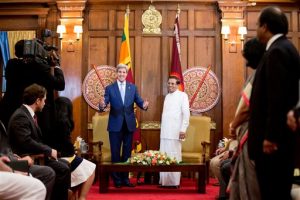On October 8, a high-powered Chinese delegation headed by the Director of the Central Foreign Affairs Commission Office and former ambassador to the United States, Yang Jiechi, visited Sri Lanka as part of his four-legged visit, which included the United Arab Emirates, Algeria, and Serbia. This was the first visit by the Chinese delegation to South Asia since the start of the COVID-19 pandemic, which had led to curbs on international travel. It’s notably that Yang chose to start with Sri Lanka.
The resulting benefits of the meeting between Yang and the Rajapaksa brothers – Mahinda, Sri Lanka’s prime minister, and Gotabaya, the country’s president – were significant as it strengthened economic cooperation and bolstered strategic ties between the two countries. The meeting presumably also provided an opening for China to clarify its intentions behind the Belt and Road Initiative (BRI) projects in the island country, after Alaina Teplitz, the U.S. ambassador to Sri Lanka, called out the nature of these projects and the opaque tender processes behind them.
On October 11, following Yang’s visit, China announced it would provide a $90 million grant to Sri Lanka for development in the medical care sector, water supplies, and education in the rural areas of the country, where the struggle for such amenities still remains. The Chinese Embassy in Colombo released a statement saying that the grant would “contribute to the well-being of (Sri Lankans) in the post-COVID era.”
As China and Sri Lanka celebrate their successes post Yang’s visit to the country, the U.S. was quick to reassert its commitment to the country. U.S. Secretary of State Mike Pompeo will visit Sri Lanka en route to New Delhi in the coming weeks, as noted by the Sunday Times. Pompeo’s travel plans signal that the U.S. is concerned about the growing closeness between Sri Lanka and China, and does not want its interests there jeopardized.
Pompeo is scheduled to visit Sri Lanka with hope to rope the island country into its regional plans given the geostrategic importance of Sri Lanka in the Indian Ocean region. The United States believes Sri Lanka could prove to be important for its Indo-Pacific strategy. The sea lanes of communication that run across the Indian Ocean are considered to be the busiest in the world, with more than 80 percent of the global oil trade passing through them.
Another important reason for this highly anticipated visit — the first by a high level American diplomat since John Kerry’s visit to Sri Lanka in 2015 — has to do with the stalled negotiations around the $480 million Millennium Challenge Corporation (MCC) grant and a new Status of Forces Agreement (SOFA). Many analysts opine that if these agreements are to be fully implemented, it would empower the United States and undermine Chinese influence in the region — but would effectively put Sri Lanka in a tight spot as well. A third, controversial, U.S.-Sri Lanka Acquisition and Cross-Servicing Agreement was renewed in 2017 a decade after it was first inked.
In June 2019, Pompeo had canceled a planned visit to Sri Lanka, reportedly over concern about growing opposition to military cooperation with the United States.
For the United States, its interests in Sri Lanka – and the aforementioned agreements – stem from the desire to gain an additional foothold in the Indian Ocean region, push back against Chinese influence there, as well as surveil China’s activities. It is likely the U.S. will seek to partner with India in these efforts as well.
What largely remains to be seen is if Sri Lanka would be welcoming of the United States’ overtures and how it intends to negotiate its position while not hindering its relations with China. While the outcomes of the upcoming Pompeo visit are still being discussed, according to a media article, a senior official of the Sri Lankan administration said that the country does not plan to bend to the United States’ wishes on the issue of MCC or SOFA when Pompeo visits for talks in a few weeks’ time. The official said, “The Gunaruwan Committee appointed by President Gotabaya Rajapaksha had gone into the MCC compact and has suggested that it be negotiated to make it compatible with Sri Lankan constitution and law. It remains to be seen if the Americans agree. As for SOFA, it cannot be on the agenda now because we would like to take up issues one by one.”
Prarthana Basu is an independent researcher and foreign policy analyst.

































